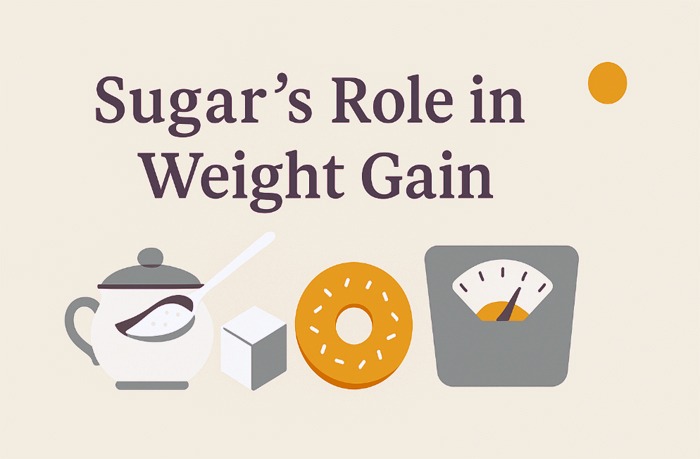Have you ever paused to think about how much sugar you’re really consuming each day? You might think you’re avoiding sweets, but sugar has a sneaky way of entering our diets through foods we’d never suspect. Even items labeled “healthy” or “low-fat” often contain high amounts of hidden sugars. Over time, this unnoticed intake can lead to weight gain, metabolic imbalances, and other health issues. Today, we explore the deeper question: What role does sugar play in weight gain? And how can understanding your own genetics through DNA-based diets help you take control?
1. Hidden Sugars Are Everywhere
Let’s start with the basics. Sugar isn’t just found in desserts and sweet treats—it’s hidden in everyday foods like bread, pasta sauce, salad dressings, flavored yogurts, ketchup, granola bars, and even so-called “diet” foods. These sugars are not always listed as “sugar” in the ingredients list. They may appear as corn syrup, high fructose corn syrup, dextrose, maltose, or fruit juice concentrate.
This leads to unintentional overconsumption. You might think you’re eating healthy, but you’re still consuming more sugar than recommended. This “hidden” sugar is one of the major contributors to gradual weight gain over time.
2. The Food Industry and Addiction to Sugar
There’s a reason sugar is added to so many packaged foods—it’s not just for taste. Sugar activates the brain’s reward system and releases dopamine, the “feel good” hormone. This creates a feeling of pleasure, which can quickly lead to repeated consumption. Food manufacturers know this. That’s why many processed foods are formulated to hit what researchers call the “bliss point”—a precise combination of sugar, fat, and salt that makes the food irresistible. Once you’re hooked, you’re more likely to buy the product again. This contributes to overconsumption and weight gain without you realizing it.
3. Sugar = Empty Calories
Sugar contains calories, but almost no nutrients. These are referred to as empty calories, and they don’t contribute to your feeling of fullness. This means you can easily consume a large number of sugar-filled calories without reducing your intake of other food. When you’re full, your body signals you to stop eating. But sugar disrupts this signal. So instead of feeling satisfied, your brain wants more—leading to unnecessary calorie intake and, eventually, weight gain.
4. Excess Sugar Becomes Belly Fat
When you consume more sugar than your body needs for energy, it gets converted into fat. And most of this fat tends to accumulate around the abdomen, which is also known as visceral fat. This type of fat surrounds important internal organs and is associated with higher risks of heart disease, diabetes, and metabolic disorders. Belly fat is not only visually concerning for many people but also medically dangerous. Targeting
this fat through exercise alone is tough—reducing sugar intake is essential to fight it.
5. Sugary Beverages – The Fast Track to Weight Gain
One of the biggest culprits of sugar-related weight gain is sugary drinks like sodas, packaged fruit juices, flavored energy drinks, and cold coffees. These drinks contain a high number of calories in liquid form—without providing any feeling of fullness. The body doesn’t register liquid calories the same way it registers calories from solid food. So after consuming a sugary drink, you’re just as hungry as before—leading you to eat more on top
of it. This is why regular consumption of these drinks is linked to rapid and significant weight gain.
6. Sugar Interferes with Fullness Signals
Normally, when you eat, your body produces hormones like leptin that tell your brain you’re full. But sugar—especially fructose—can interfere with these signals. Your body might have consumed enough calories, but your brain doesn’t get the message. As a result, you continue to eat, even when you don’t need to. This effect is even more pronounced in people who have insulin resistance or are overweight already, which makes sugar consumption a vicious cycle.
7. Genetics Matter: Some People Store Sugar Faster
Genetics plays a crucial role in how your body responds to sugar. Some individuals are genetically predisposed to store fat more efficiently from sugar, while others may burn it more quickly. If obesity or type 2 diabetes runs in your family, your body may be more sensitive to sugar’s effects. This is where DNA-based diet planning comes in. By understanding your genetic blueprint, you can find out how well (or poorly) your body metabolizes sugar. This insight allows for more accurate diet choices and more efficient weight management.
8. Sugar Increases Your Craving for… More Sugar
Ever noticed that once you start eating sugar, you just can’t stop? That’s because sugar can create an addictive cycle. When you eat sugar, your brain releases dopamine—just like it would with addictive substances.
Over time, you develop a tolerance. So, you need more sugar to get the same “pleasure” effect. This cycle leads to more frequent cravings, increased intake, and eventually, significant weight gain.
9. Sugar Disrupts Your Gut Health
Your gut microbiome—the collection of healthy bacteria in your digestive tract—plays a big role in your metabolism and immune system. Too much sugar can negatively impact this microbiome, leading to bloating, poor digestion, and inflammation. A healthy gut promotes efficient digestion, better energy levels, and easier weight loss. But sugar feeds harmful bacteria and yeast in the gut, throwing off the balance and making it harder
for your body to lose weight effectively.
10. Sugar Fuels Inflammation and Slows Fat Loss
One of the lesser-known effects of sugar is its role in chronic inflammation. Inflammation is your body’s response to injury or stress—but when it’s chronic, it becomes harmful. High sugar intake promotes this kind of internal inflammation. Chronic inflammation interferes with your body’s natural fat-burning process. This means even with exercise and calorie control, your weight loss can be slower and more frustrating.
DNA-Based Diets Help Personalize Your Sugar Intake
We’ve established that everyone’s response to sugar is different. That’s why DNA Diet Clinic by Dr. Rushikesh Trivedi offers DNA-based nutrition plans. These plans use genetic testing to determine how your body metabolizes sugar, fats, carbs, and other nutrients.
This allows you to:
● Understand your individual risk of obesity or diabetes
● Know how much sugar your body can safely handle
● Customize your diet to support long-term weight control and better health
A DNA-based diet is not about removing all sugar. It’s about optimizing your sugar intake for
your unique body.
✅ Conclusion: Be Sugar Smart
Weight gain isn’t just about eating too much or moving too little—it’s also about what you’re eating. Hidden sugars in everyday foods can quietly sabotage your health and weight goals. They create cravings, add empty calories, and interfere with your body’s natural balance. The good news? You can take control. Understanding your sugar consumption, reading labels, and most importantly—knowing your genetic predisposition through a
DNA-based consultation can be a game-changer for your health.
So ask yourself: What role does sugar play in your weight gain? And are you ready to find
the answer based on your DNA?
📞 Call DNA Diet Clinic (Ahmedabad) today to book your consultation with Dr. Rushikesh Trivedi: 099133 30931


